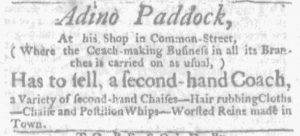What was advertised in a colonial American newspaper 250 years ago this week?

“A second-hand Coach, a Variety of second-hand Chaises.”
Adino Paddock, a coachmaker, occasionally advertised in Boston’s newspapers in the late 1760s and early 1770s. He took to the pages of the public prints to promote his business with an advertisement in an extraordinary issue of the Massachusetts Gazette and Boston Weekly News-Letter on March 23, 1770. In it, he proclaimed that “the Coach-making Business in all its Branches is carried on as usual” at his shop “in Common-Street.”
Paddock also extended one of his “usual” appeals to potential customers, informing them that he offered for a sale “a second-hand Coach” and “a Variety of second-hand Chaises.” He incorporated used carriages of all sorts into most of his marketing, presenting consumers a less expensive alternative to purchasing new coaches and chaises. As many of his other advertisements made clear, he acquired secondhand carriages by accepting them as partial payment when customers placed orders. Paddock deployed what would later become familiar marketing and financing strategies in the automobile industry in the twentieth and twenty-first centuries. He did so in the early modern era, more than a century before cars were mass produced and sold to consumers. He anticipated some now-standard strategies for selling transportation to individual customers.
Paddock also made a “Buy American” appeal, though much less explicitly. The elite who could afford carriages did not have to purchase coaches and chaises imported from England when they could instead acquire the same items made at his shop in Boston. Furthermore, he sold ancillary goods, including “Worsted Reins,” made locally rather than imported. Paddock did not name his supplier, but he assured prospective customers that the reins he sold were “made in Town.” While he did little to underscore the point, it likely would have reverberated all the same considering how much attention residents of Boston and beyond devoted to the nonimportation agreements then in effect to protest duties on imported paper, glass, lead, paint, and tea. Coverage extended across news items, editorials, and even advertisements.
Consisting solely of text without images, Paddock’s advertisement for carriages is not nowhere near as flashy as print advertisements for automobiles from the twentieth and twenty-first centuries nor, especially, modern television and internet advertisements. Comparatively humble in appearance, Paddock’s advertisement did, however, pioneer some of the marketing techniques that later became standard practices in the automobile industry.
